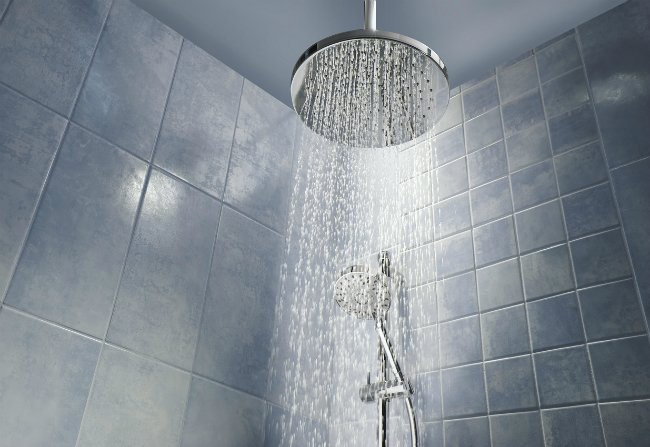We may earn revenue from the products available on this page and participate in affiliate programs. Learn More ›
Q: Even though my shower was perfectly toasty when I hopped in, it quickly chilled until there was no hot water left at all—even an hour later. What gives?
A: Assuming that no one else has been hogging the hot water all day, and you have no hot water in the house but have cold water, the problem of having no hot water probably lies within your water heater.
First, confirm that your water heater is the appropriate size for your daily household needs. These units range in size from about 30 to 80 gallons, with the smaller end of the spectrum ideal for the modest needs of a single-person, half-house setup and the larger end suited for families with multiple children.
Assuming the water heater is big enough for your family’s needs, how you proceed in troubleshooting your water heater not heating will depend on the type of water heater you have, gas versus electric.

First things first…
Bump up the thermostat.
Ideal operating temperatures for hot water heaters are between 122 and 140 degrees Fahrenheit. A system running below this range risks not only a hot water deficit but also the potential for growth of Legionella bacteria, which are responsible for a severe form of pneumonia known as Legionnaires’ disease. If the water heater isn’t already set in the ideal range, adjust it. In 30 to 40 minutes, you can expect hot water to return, and within two hours the unit should reach a temperature that will prevent the growth of pathogens.
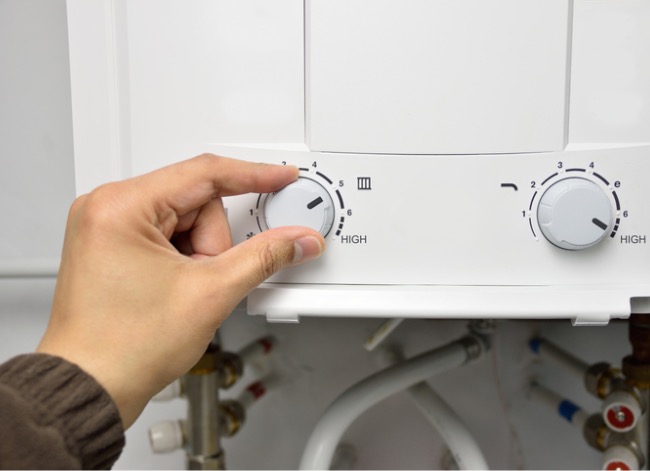
Check the forecast.
A sudden cold snap in your area can impact the effectiveness of your gas- or electric-powered water heater, even causing it to conk out. This most often occurs overnight, when the heater sits unused and temperatures plunge. If your recent weather aligns with this scenario and your boiler is still running, try turning the hot water heater up to its max in order to kick it back into gear. After a half hour, turn on a kitchen or bathroom faucet to see if the water warms up after running for a few minutes. If it does heat up, return the hot water heater setting back to normal operating temperature, or even raise it a few degrees higher than usual until the cold snap ends.
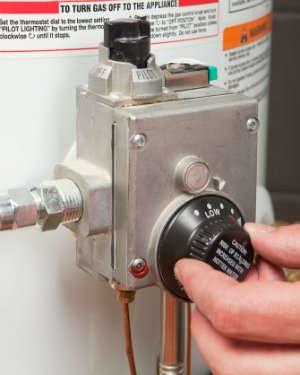
If yours is a gas-powered water heater…
Relight the pilot light.
If your gas water heater’s pilot light has been snuffed out by a downdraft in a vent pipe on a stormy day or the breeze through an open window, see if you can relight it with ease following the instructions permanently affixed to the side of your unit. In some instances—such as when a water heater’s pilot light sits in an enclosed burner chamber—you may need to call in a plumber. If, however, you smell gas while you’re sniffing out the problem, hightail it out of the house and call the gas company!
Fix a faulty thermocouple.
If you can successfully light the pilot light but the flame doesn’t stay on after you release the control knob, the thermocouple—a safety device that shuts off gas flow if it senses that the pilot light is out—may be at fault. The tip of this copper tube should be in the flame of the pilot light; if it’s out of line, it could need adjusting or replacing. Fortunately, a thermocouple doesn’t cost a fortune, and replacing it can be a DIY repair.
Rekindle a blue flame.
Is your water not so frigid as it is lukewarm? Does your pilot light burn yellow rather than the standard blue? These are symptoms of a gas-to-air ratio problem. First, be aware that a yellow flame could mean that the boiler is releasing carbon monoxide, a colorless, odorless, and toxic gas. Check for drafts or open windows that might be causing the pilot light to burn inefficiently, and remedy the breezy situation. If this doesn’t return the pilot to a crisp, blue flame, call a technician to check out the unit. In the meantime, pay attention to any signs of carbon monoxide poisoning (dizziness, faintness, or nausea), and if necessary leave the house immediately to seek medical assistance.
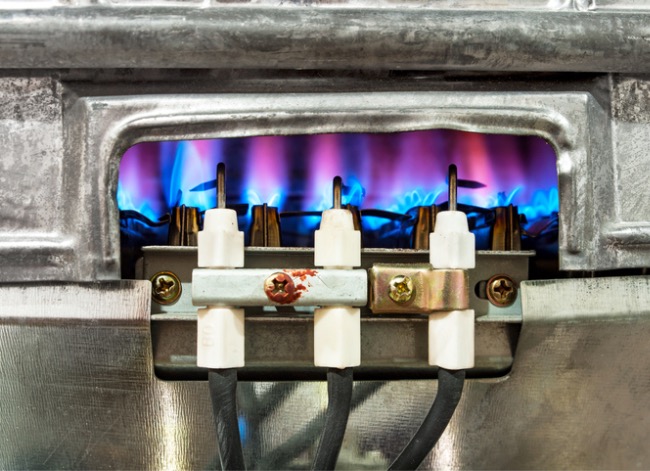
Inspect the gas line.
If after turning the valve on you neither see a pilot light nor smell gas, the problem may lie with the fuel source. Check whether the gas valve is open or closed, and eyeball the gas line for any kinks that might be causing a roadblock. If you’ve adjusted the gas flow and nothing has improved, call the gas company to ensure that there’s service in your area and that your account isn’t in arrears. If the gas company assures you that you should have gas, yet turning the valve on still doesn’t produce gas (you’ll smell it if it’s there), then it’s probably time to contact a plumber or other professional.
If your water heater runs on electricity…
Restart your water heater.
A current can go awry as a result of a power surge from an electrical storm. Try turning your electric unit off for a couple of minutes and then switch it back on. If after a half hour the hot water is not working, you’ll need to move on to another solution. Proceed cautiously: Before you attempt to repair or even inspect the water heater, make sure the unit is off. These appliances draw enough power that an accidental electrocution could be fatal, so work carefully or call in a pro.
Reset the circuit breaker.
If tripped, the water heater’s dedicated breaker may not appear to be “off” but could still be just a little out of whack—not quite in line with the other “on” breakers. Flip it off, wait for 20 seconds, then flip it back on. A breaker that doesn’t hold the “on” position may have failed from age or overwork. If that’s the case, call on a professional for replacement.
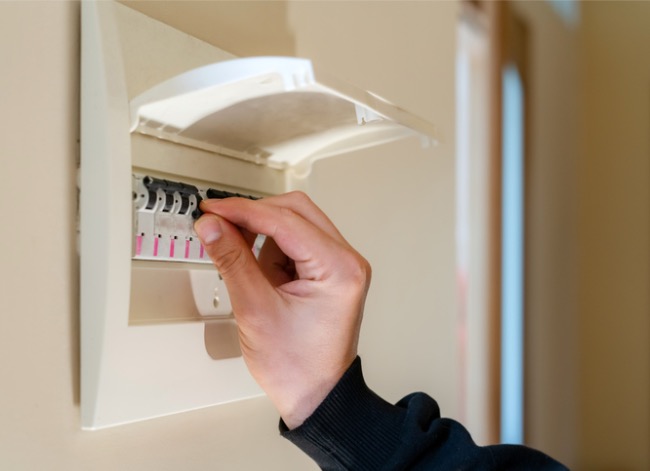
When all else fails…
Call in the professionals.
Concern over safety coupled with the technical nature of a water heater repair mean that it’s best to leave the work to the professionals. If your unit is not on its own breaker—or the breaker needs replacing—call a qualified electrician. Or, if your tank leaks onto the ground or inside the heater’s compartments, bring in professionals to service your water heater before it damages the heating elements or stops thermostat function. He or she may check the heating element for the water heater to ensure it is functioning properly. You might also want to have the pro check that the high temperature cutoff switch is working correctly. If the water gets too hot, the heater can shut down altogether.
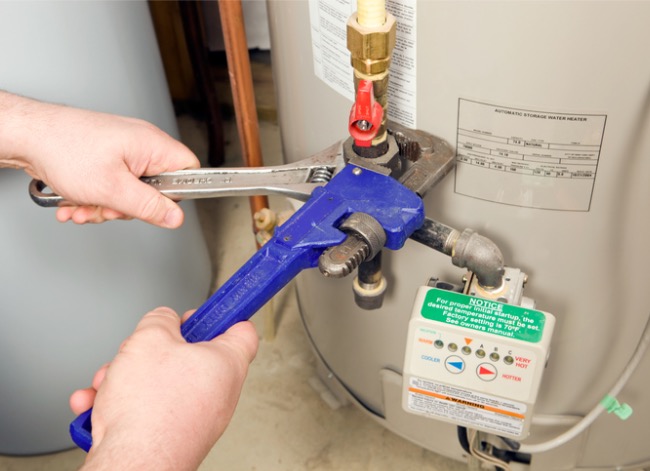
The life span of water heaters is anywhere from 10 to 20 years and beyond, depending on type.
Standard hot water heaters—the type with a big tank tucked into an enclosed space somewhere — have a typical life span of about 10 years. Tankless, or on-demand, water heaters often last more than 20 years. If your hot water heater is approaching its maximum life expectancy, its elements, thermostat, or other components may soon fail and need replacement. It’s important to assess whether replacing the parts makes sense. In the case of a standard heater, it may be smarter to replace your water heater altogether and capitalize on the improved energy efficiency that a newer unit would offer. When it comes to tankless water heaters, however, the ability to easily and affordably replace parts as needed is a way to greatly extend the life of your tankless hot water heater without the need for replacement. Homeowners can plan ahead by purchasing a home warranty. Policies from one of the best home warranties for plumbing (like American Home Shield) can help pay to repair or replace water heaters that break down due to normal wear and tear.
Avoid the misery of a cold shower — replace the hot water heater before it fails.
Perhaps you’ve already replaced the heating element for your water heater and performed other maintenance tasks and yet still the water heater is not working consistently, leaving you in the cold. It may be time to replace the water heater before it fails altogether. Consider the unit’s age, the number of repairs it’s undergone, the times you’ve had to “reset” it because you’ve turned into a Popsicle in the shower, the odd noises it emits, and those worrisome leaks you’ve noticed. If the signs are there, it might be time to replace your hot water heater with a new, reliable unit.
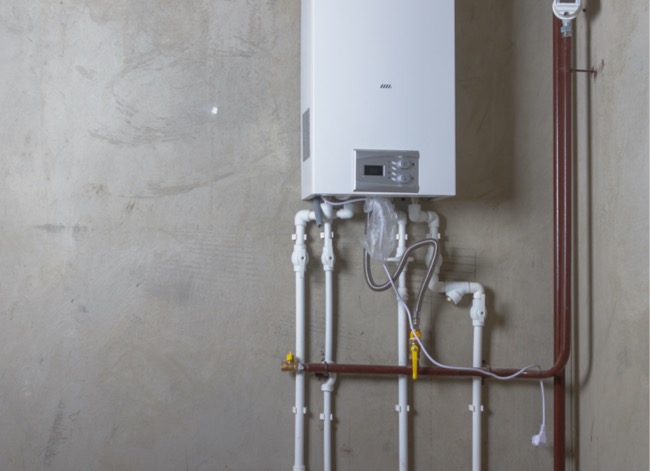
Final Thoughts
Whether you’re mid-shower or cleaning up after dinner, losing hot water is no fun. Fortunately, a few sure-fire steps will help ensure you rarely encounter this problem or can fix it quickly if it does occur. Start by ensuring you have the right hot water heater for your needs, keep that heater well-maintained, and then if something goes awry anyway, run through a checklist of problem-solving steps to feel the warmth once again.
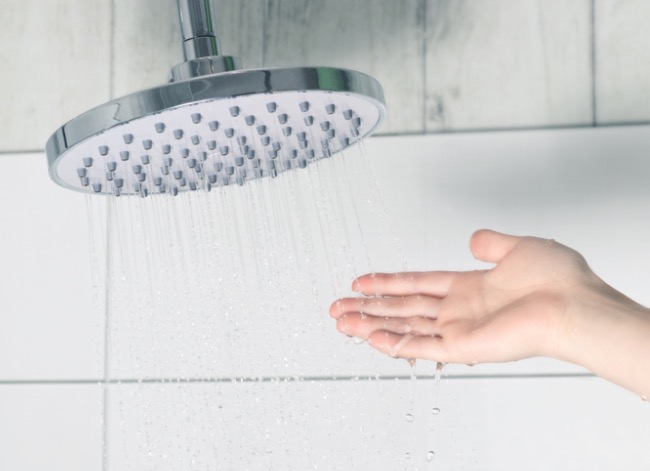
FAQs About Why You May Have No Hot Water
Q: How do you reset your hot water heater?
If you have a gas hot water heater, you may need to relight the pilot light. For an electric hot water heater, hit the reset button if there is one, or unplug the water heater for a couple minutes, and then plug it back in. If that doesn’t work, reset the breaker associated with the hot water heater.
Q: What should I check first when there’s no hot water?
First, check that the thermostat on your water heater is set appropriately. Ideally, your hot water heater is set to heat water to somewhere between 122 and 140 degrees Fahrenheit.
Q: What causes hot water to stop working during a storm?
If temperatures plunge due to a winter storm, you may need to turn up the heat setting on your hot water heater. Also check that power and gas supply is uninterrupted.
Q: What is the most reliable type of water heater?
Many consumers find tankless water heaters to be the most reliable water heaters. These water heaters have fewer moving parts that can wear out over time, and their parts are used only when needed to supply hot water on demand, not constantly as with storage tank water heaters.
